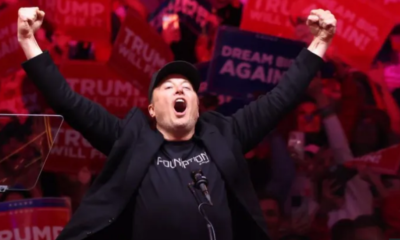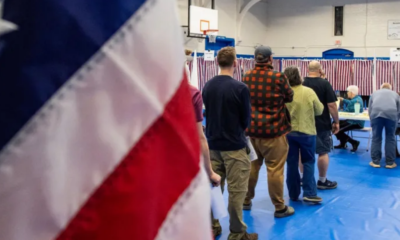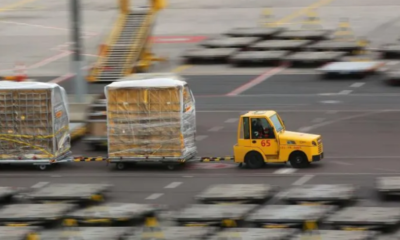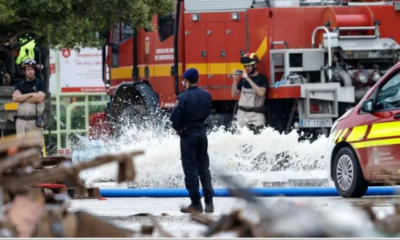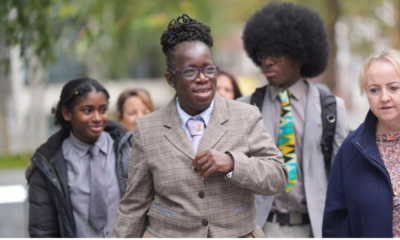North Korean soldiers have clashed with Ukrainian troops for the first time, marking a significant escalation in the ongoing war in Ukraine. Ukrainian Defence Minister Rustem Umerov confirmed the incident in an interview with South Korean broadcaster KBS, stating that a “small group” of North Korean soldiers had been involved in a confrontation with Ukrainian forces. Ukrainian President Volodymyr Zelensky condemned the lack of response from the West, calling the clash the beginning of a “new chapter of instability” in the world. He warned that these first battles with North Korea could have far-reaching consequences for global security. However, South Korea’s government has played down the severity of the incident, with Seoul officials stating they do not believe that direct combat took place. Instead, they described the event as an “incident” involving a small number of North Korean troops near the frontline. Despite this, tensions are rising, as Ukraine claims that up to 11,000 North Korean soldiers are stationed in the Kursk border region, where Ukrainian forces have a presence. Reports from South Korean, U.S., and NATO intelligence agencies over the past few weeks have pointed to the involvement of North Korean troops in Russia’s ongoing invasion of Ukraine. While Moscow and Pyongyang have not directly addressed these allegations, the situation has raised concerns internationally. The first reports of North Korean military involvement came from Andriy Kovalenko, Ukraine’s top counter-disinformation official, who posted on Telegram that North Korean units had come under fire in the Kursk region. Umerov confirmed these reports, stating that while the encounters so far have been minor, a “significant number” of North Korean troops are expected to be deployed in combat in the future. He noted that many of the troops are still undergoing training in Russia and are being integrated into Russian military units. According to Umerov, the North Korean soldiers, who are reportedly wearing Russian uniforms, are being trained in tactics and deployed under Russian command on the front lines. He mentioned that about five units, each consisting of roughly 3,000 soldiers, are expected to be involved in operations. Although no casualties have been reported, the involvement of North Korean troops is raising alarm both in Ukraine and internationally. In a daily video address, Zelensky called on Ukraine and its allies to ensure that this “Russian step toward expanding the war” would fail for both Russia and North Korea. The situation has also sparked diplomatic tensions, with South Korea having summoned Russia’s ambassador last month to demand the withdrawal of North Korean troops. In addition, Seoul has warned that it may consider directly supplying arms to Ukraine in response to this growing involvement. Analysts suggest that Pyongyang could be compensated for its support with Russian military technology or other incentives. On Wednesday, Russian lawmakers are set to vote on a mutual defense treaty with North Korea, further solidifying the alliance between the two countries.
News
Elon Musk Set to Benefit from Trump’s Return to the White House
News
Markets Surge as Trump Re-Elected, Dollar and Bitcoin Hit Record Highs
Wall Street shares soared to record levels, and the U.S. dollar marked its largest gain in eight years after Donald Trump’s historic re-election victory to the White House. Investors responded swiftly, with major U.S. indexes rallying and Bitcoin hitting an all-time high as markets anticipated a policy shift focused on tax cuts, higher tariffs, and a pro-crypto agenda.
Trump’s election campaign promised to establish the U.S. as a global hub for Bitcoin and other cryptocurrencies, which, combined with anticipated fiscal policies, has driven a surge in digital assets. The value of Bitcoin jumped by $6,000 to reach a record high of $75,371.69.
Investors are betting that Trump’s proposed tax cuts and increased tariffs will spur inflation, which may prompt the Federal Reserve to keep interest rates higher for an extended period. Higher rates would yield better returns on dollar-denominated assets, creating additional demand for the currency. As a result, the dollar rose by about 1.75% against major currencies, including the pound, euro, and Japanese yen.
Global Market Movements
Trump’s re-election has had a sweeping impact on global financial markets and currencies:
- U.S. Stock Market: Key U.S. indexes jumped as trading opened, with banking stocks performing exceptionally well, buoyed by expectations of regulatory easing.
- Dollar Gains: The dollar rallied by approximately 1.75% against a range of currencies.
- Pound and Euro: The pound dropped 1.41% against the dollar, hitting its lowest level since August, while the euro fell 2.24% to its lowest point since June.
- FTSE 100: The UK’s FTSE 100 index rose by 0.1% on Wednesday afternoon.
- Asian Markets: In Japan, the Nikkei 225 index closed 2.6% higher, and Australia’s ASX 200 rose by 0.8%, while in China, the Shanghai Composite Index dipped slightly by 0.1%, and Hong Kong’s Hang Seng was down by around 2.23%.
Bitcoin’s Record Surge
Bitcoin’s value surged following Trump’s pledge to make the U.S. the “Bitcoin and cryptocurrency capital of the world,” contrasting sharply with the previous administration’s more stringent stance on digital assets. During his campaign, Trump signaled potential changes at the U.S. Securities and Exchange Commission (SEC), including a plan to dismiss Chair Gary Gensler, who has been criticized by the crypto community for his strict regulatory approach. Trump’s willingness to scale back crypto oversight is seen as a positive move by investors, helping push Bitcoin to record highs.
Elon Musk, a long-time cryptocurrency advocate and supporter of Trump, could also play a central role in this new policy direction. Trump suggested that Musk would lead a government audit to identify wasteful spending, a move that is expected to further stimulate support for cryptocurrencies. Tesla, Musk’s electric vehicle company, famously invested $1.5 billion in Bitcoin in 2021. On Wednesday, Tesla’s Frankfurt-listed shares surged by over 14% in early trading.
Broader Economic Implications
Analysts anticipate that Trump’s tax cuts and tariffs could push up inflation, leading to fewer rate cuts and potentially higher rates for longer. “Investors are bracing for tariffs… which will push up the price of imported goods for American shoppers,” said Susannah Streeter, head of money and markets at Hargreaves Lansdown.
Meanwhile, Trump’s immigration policies could raise wage costs for U.S. companies if restrictions reduce labor availability, potentially increasing inflationary pressures. These policy shifts may have ripple effects across the global economy as other nations respond to U.S. tariffs with measures of their own, affecting trade flows and potentially stoking global inflation.
With U.S. and global markets reacting swiftly to Trump’s victory, financial analysts will continue monitoring the administration’s first moves, especially regarding fiscal and trade policies, as the world adjusts to Trump’s second term.
News
EU Faces Challenges in Combatting Violence Against Women, Says Commissioner-Designate
During his confirmation hearing on Tuesday, Michael McGrath, the Commissioner-designate for Democracy, Justice, and the Rule of Law, emphasized the European Union’s ongoing struggle against violence towards women and girls, referring to rape as an “abominable crime.” He called for greater uniformity and consistency among member states in addressing these issues and indicated his willingness to consider proposals for adding gender-based violence to the list of Euro-crimes if further action is deemed necessary.
Euro-crimes refer to criminal activities that have an impact on multiple EU member states or pose significant threats to the Union’s financial and economic interests, including terrorism, human trafficking, and money laundering.
Earlier this year, the EU passed a landmark directive aimed at combating violence against women and domestic violence. This directive introduced new penalties for crimes against public figures, journalists, and human rights activists, as well as new rules to prohibit forced marriage and female genital mutilation. However, the directive did not classify rape—defined as sex without consent—as a Euro-crime due to a lack of consensus among member states.
During the hearing, MEP Assita Kanko from the far-right European Conservatives and Reformists group questioned McGrath about his plans to ensure consistent criminalization of rape across the EU. McGrath responded that the European Commission could encourage member states to adopt consent-based definitions of rape when transposing the directive into national law. Countries such as Belgium, Greece, Ireland, Spain, and Sweden already employ such definitions.
The Commission originally proposed the directive on March 8, 2022, with the goal of standardizing laws across the EU to criminalize various offences, including cyber violence and female genital mutilation, alongside rape. However, the proposal sparked a clash between the European Parliament and the Council, with MEPs supporting the inclusion of non-consensual sex as a criminal offense while EU capitals were divided over legal competencies.
Despite extensive negotiations, the Council could not achieve the necessary majority to pass the proposal. Ultimately, the Parliament agreed that having a law, even without the inclusion of rape as a Euro-crime, was better than none. MEP Evin Incir, a leading advocate for the new rules, hailed the Parliament’s approval as a historic step towards strengthening women’s rights and ensuring a future where women can live free from fear and oppression.
The Parliament and the Council agreed that the Commission will report every five years on the situation of women and girls in the EU, evaluating the necessity of reviewing the directive. Statistics reveal that two in ten women in the EU have experienced physical and/or sexual violence from partners or acquaintances, contributing to an estimated societal cost of €290 million annually at the EU level.
-

 Travel7 months ago
Travel7 months agoEmbracing Solo Travel to Unlock Opportunities for Adventure and Growth
-

 Education7 months ago
Education7 months agoExlplore the Top Universities in the United States for Computer Science Education?
-
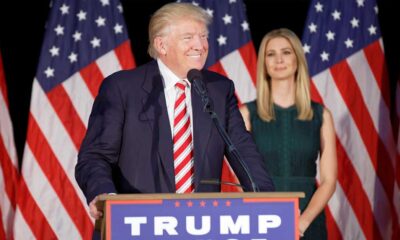
 Politics7 months ago
Politics7 months agoSix Best Things Done by Donald Trump as President
-

 Technology7 months ago
Technology7 months agoRevolutionizing Healthcare Training with Latest Technologies
-

 Health7 months ago
Health7 months agoRise of Liposuction: A Minimally Invasive Solution for Body Contouring
-

 Business7 months ago
Business7 months agoThriving Startup Hubs: Best Cities in the USA for Entrepreneurship
-

 Travel7 months ago
Travel7 months agoWhere to Move? America’s Top Ten Most Affordable Cities
-

 Health7 months ago
Health7 months agoDigestive Power of taking Mint Tea after Meals

